[Rock Fist Way Down]
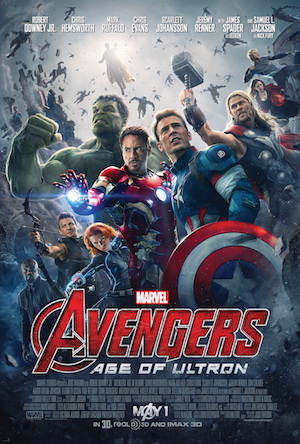 Joss Whedon’s Avengers: Age of Ultron is a total failure of writing, of character development, and of visual storytelling in general. Whedon relies not just on tired tropes, overused themes and narrative shortcuts, but also just rehashes his first Avengers movie. It is as if he has pulled names, themes and plot devices that occurred in The Avengers out of a hat, and reused each to make Age of Ultron.
Joss Whedon’s Avengers: Age of Ultron is a total failure of writing, of character development, and of visual storytelling in general. Whedon relies not just on tired tropes, overused themes and narrative shortcuts, but also just rehashes his first Avengers movie. It is as if he has pulled names, themes and plot devices that occurred in The Avengers out of a hat, and reused each to make Age of Ultron.
If you loved The Avengers, and you know before seeing it, that you will love Avengers: Age of Ultron, just stop reading. You are not my audience. My audience is the narrow group of moviegoers who went into Age of Ultron hopeful, and yet left disappointed. For those folks, I will try to analyze why Whedon’s overstuffed epic fails.
Age of Ultron begins with the Avengers taking down a Hydra base to retrieve Loki’s scepter. Here they encounter Quiksilver (Aaron Taylor-Johnson) and Scarlet Witch (Elizabeth Olsen), who plays on Tony Stark’s (Robert Downey Jr.) fear of the Earth’s destruction. Those fears will inspire the creation of Ultron (James Spader).
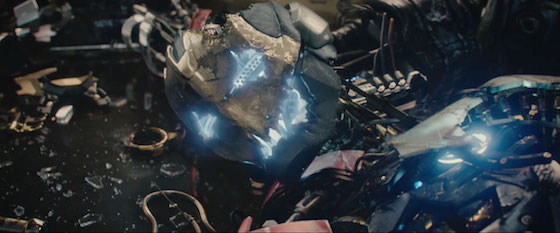 Stark has been working on artificial intelligence for sometime. His longtime software friend, Jarvis (Paul Bettany), is a limited version of his A.I. aspirations. When Loki’s scepter gives off readings of computer sentience, Stark encourages Bruce Banner (Mark Ruffalo) to help him harness it into a fully functioning A.I. Ultron is born after the lamest progression-of-time montage ever filmed.
Stark has been working on artificial intelligence for sometime. His longtime software friend, Jarvis (Paul Bettany), is a limited version of his A.I. aspirations. When Loki’s scepter gives off readings of computer sentience, Stark encourages Bruce Banner (Mark Ruffalo) to help him harness it into a fully functioning A.I. Ultron is born after the lamest progression-of-time montage ever filmed.
Ultron attacks and destroys Jarvis, which visually looks like a blue circle attacking and breaking a yellow circle. It is as exciting as it sounds. Ultron then makes himself a body from one of the broken Iron Sentries.
An unfeeling robot, Ultron dedicates himself to peace on Earth at all cost. Since humans are the biggest threat to peace, Ultron decides to destroy them all. Scarlet Witch and Quicksilver join him as a way to get rid of Ironman and the Avengers.
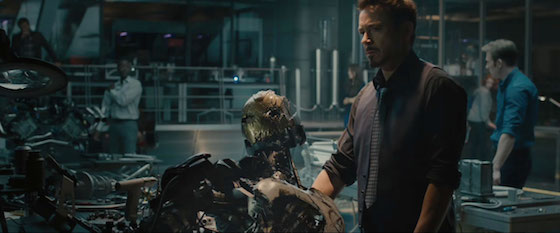 Building an army of robot copies, Ultron decides that the town of Sokovia would make a great asteroid with which to destroy the Earth.
Building an army of robot copies, Ultron decides that the town of Sokovia would make a great asteroid with which to destroy the Earth.
Throw in a couple of narrative wormholes, including Jarvis’ miraculous resurrection and Thor’s (Chris Hemsworth) mystical waters of seeing, add three instances of deus ex machine – Jarvis as online defender against hacker Ultron, The Vision, and Nick Fury with his rescue airship – and we’ve got ourselves a movie.
The countless interchangeable bad guys set up only for the Avengers to knock down shift from the alien Chitauri, in the first film, to the robotic copies of Ultron, in the second. Even the wormhole at the end of The Avengers is rethought as asteroid Sokovia. Still with seconds on the clock, and the world in mortal peril will the Avengers succeed in protecting the human race?
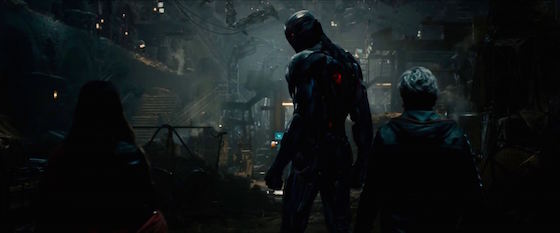 Of course they will, if only for god-Whedon out of the machine. He gives us off screen solutions to problems that should demand sacrifice. At the end when a character must die, Whedon chooses the far more disposable, instead of the character whose loss might cause the viewer real pain.
Of course they will, if only for god-Whedon out of the machine. He gives us off screen solutions to problems that should demand sacrifice. At the end when a character must die, Whedon chooses the far more disposable, instead of the character whose loss might cause the viewer real pain.
Oh but the characters. At least there is great character development, right?
Do not mistake expositional statements of the movie’s themes, reused from The Avengers, as character development.
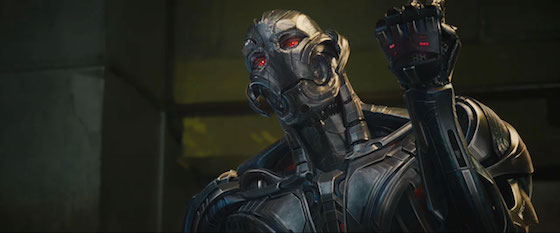 When Tony Stark eggs on Bruce Banner to help create Ultron, he tells Banner that the team already sees them as monsters, as mad scientists. They should embrace it and use their mad scientist ways to make bold, irrational decisions without consent from the team.
When Tony Stark eggs on Bruce Banner to help create Ultron, he tells Banner that the team already sees them as monsters, as mad scientists. They should embrace it and use their mad scientist ways to make bold, irrational decisions without consent from the team.
This theme of “Are we monsters?” is reiterated by Black Widow (Scarlett Johansson), when she talks of her training and inability to have children. She says to Bruce Banner that the final step to her becoming an assassin was a forced sterilization, and then tells him that he is not the only monster on the team. This equates inability to become a mother with being monstrous and is a despicable continuation of saddling female characters to their ability to carry a child.
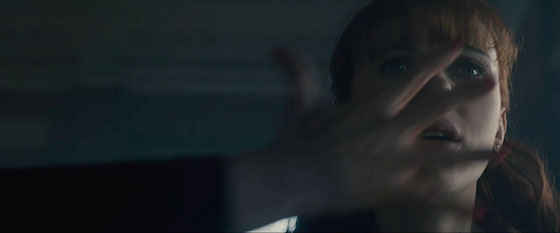 I don’t care if this is consistent with the comics. You’re making an adaptation for the screen and have a female character in Black Widow, who could be defined by her ambitions and excellence. Whedon chooses to chain this female character to her nonfunctional gonads. It is reductive and offensive and meant as an emotional low blow to make the viewers say, “Awwwww,” for all of 15 seconds.
I don’t care if this is consistent with the comics. You’re making an adaptation for the screen and have a female character in Black Widow, who could be defined by her ambitions and excellence. Whedon chooses to chain this female character to her nonfunctional gonads. It is reductive and offensive and meant as an emotional low blow to make the viewers say, “Awwwww,” for all of 15 seconds.
The childlessness Ms. Romanoff is used as a foil to Hawkeye’s (Jeremy Renner) procreative prowess. After the creation of the titular enemy, the Avengers must go into hiding. Hawkeye takes the group to his home where he has a secret pregnant wife (Linda Cardellini) and two children.
Here we once again get thematic exposition instead if character development. Hawkeye is questioning his role on the team. His wife is watching as Thor and Captain America (Chris Evans) move around the yard and comments on their god-like abilities. She goes on to say that Hawkeye’s humanity is why he is needed in the group. This is voiced so the viewer might understand Hawkeye as the human conscience in a group of gods and monsters.
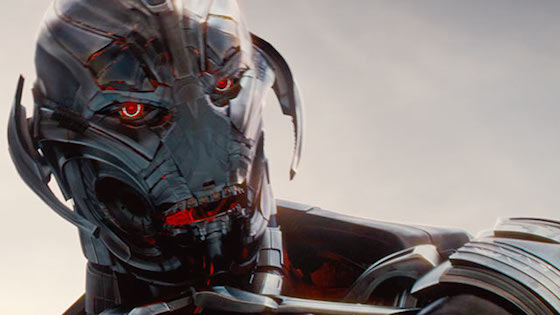 So we have the voicing of one theme; this group of heroes is really the same as the monsters they fight. Stark, Romanoff, Banner, and Ultron reiterate this theme openly. Then normalness, or even weakness proffered as strength comes via Hawkeye and his wife. Which leads to the final theme, and the quintessential theme of the Avengers, togetherness. Both Nick Fury (Samuel L. Jackson) and Captain America make sure they state in one way or another, that the way to fight and win is together.
So we have the voicing of one theme; this group of heroes is really the same as the monsters they fight. Stark, Romanoff, Banner, and Ultron reiterate this theme openly. Then normalness, or even weakness proffered as strength comes via Hawkeye and his wife. Which leads to the final theme, and the quintessential theme of the Avengers, togetherness. Both Nick Fury (Samuel L. Jackson) and Captain America make sure they state in one way or another, that the way to fight and win is together.
The most egregious instance of character shallowness is the treatment of Ultron. He is born bad and wants to destroy all humans. That is it. That is as much as he gets.
Instead of spending so much time rehashing the Avenger’s team-building skills, which we saw plenty of in the first film, Whedon should have given significantly more screen time to Ultron. He could have added struggle and depth to the character. Age of Ultron should have been Ultron’s story.
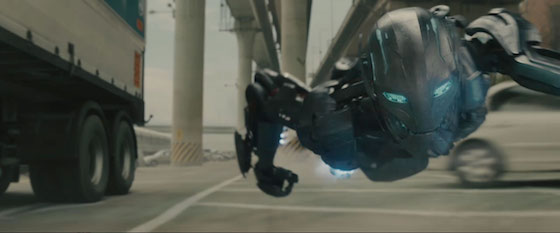 If these costumed super heroes are truly the gods of our time and the films that they are in each summer are our contemporary mythological canon, then these films should reflect our current understanding of each other, including visual representation of women and minorities, instead of parading out old narrative tropes and stereotypes as if they were steadfast truths.
If these costumed super heroes are truly the gods of our time and the films that they are in each summer are our contemporary mythological canon, then these films should reflect our current understanding of each other, including visual representation of women and minorities, instead of parading out old narrative tropes and stereotypes as if they were steadfast truths.
Avengers: Age of Ultron is just another in a long line of hackneyed cash grabs, meant to entertain and reinforce the sensibilities of 13-year-old boys.
Joss Whedon, you should have done better.







{ 3 comments }
Damn fine writing, Trey. I’m anxious to see this now, if only to have a discussion with you on these points.
Warren,
I can’t wait. Always love to get your take.
Tough but fair, Trey. I kind of enjoyed the “during” just to see how messy they could make it. And there were a handful of good moments. But I came away thinking, “I will never watch this movie again.”
Comments on this entry are closed.